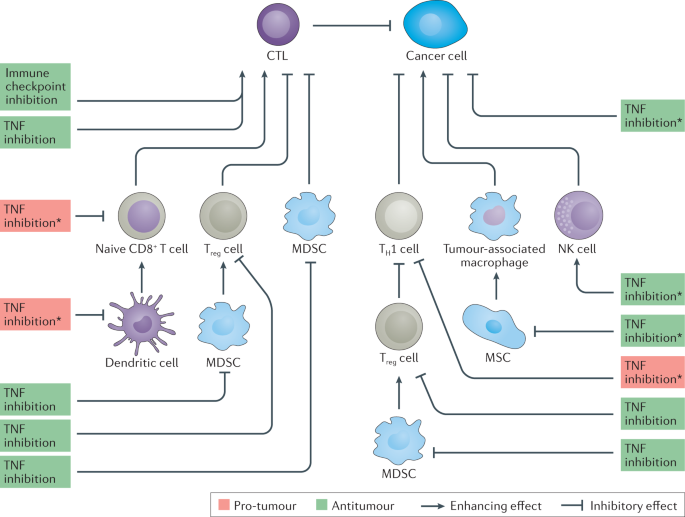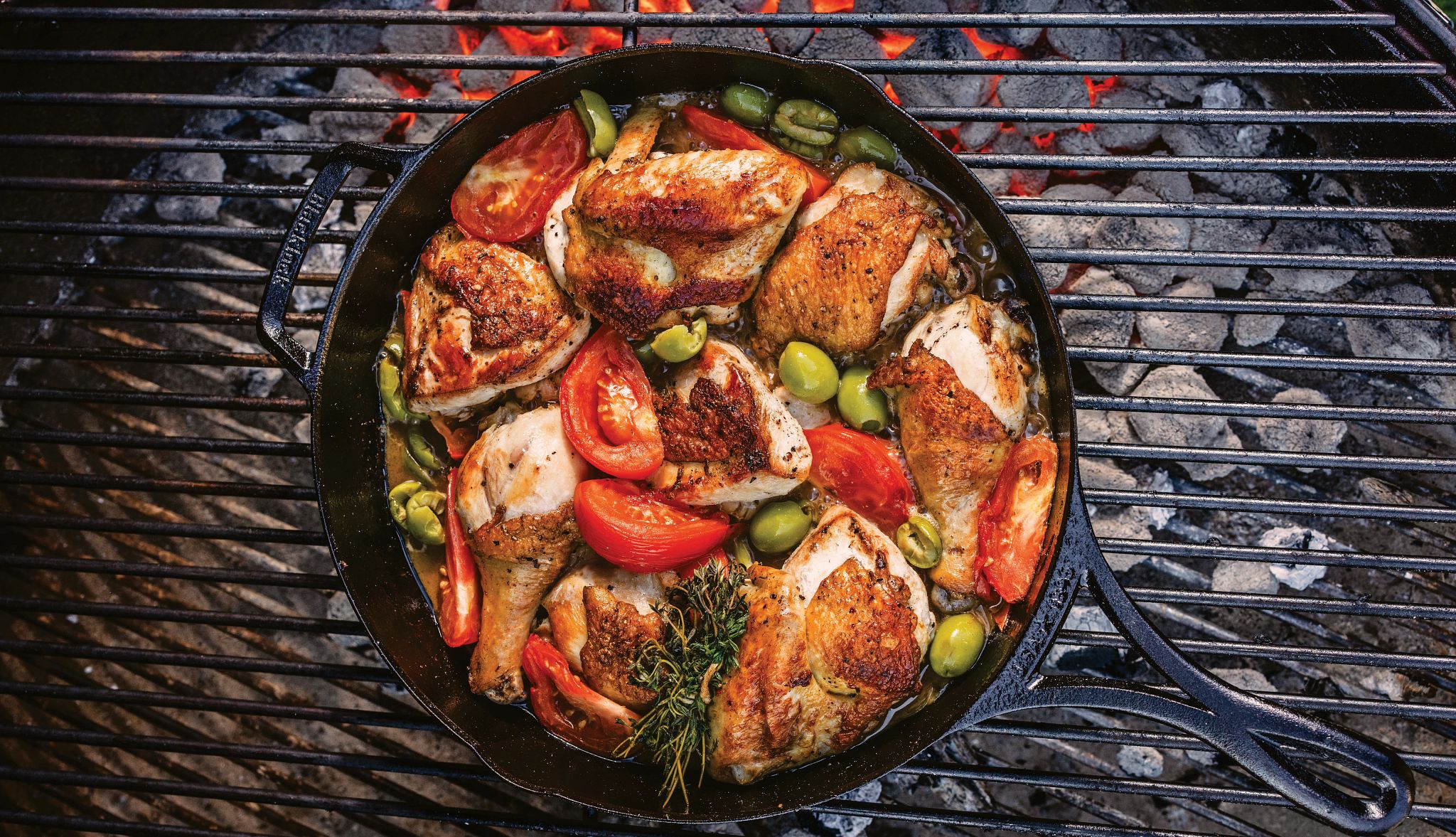
- Select a language for the TTS:
- UK English Female
- UK English Male
- US English Female
- US English Male
- Australian Female
- Australian Male
- Language selected: (auto detect) - EN
Play all audios:
ABSTRACT Immune checkpoint inhibitors (ICIs) are effective in the treatment of patients with advanced cancer and have emerged as a pillar of standard cancer care. However, their use is
complicated by adverse effects known as immune-related adverse events (irAEs), including ICI-induced inflammatory arthritis. ICI-induced inflammatory arthritis is distinguished from other
irAEs by its persistence and requirement for long-term treatment. TNF inhibitors are commonly used to treat inflammatory diseases such as rheumatoid arthritis, spondyloarthropathies and
inflammatory bowel disease, and have also been adopted as second-line agents to treat irAEs refractory to glucocorticoid treatment. Experiencing an irAE is associated with a better
antitumour response after ICI treatment. However, whether TNF inhibition can be safely used to treat irAEs without promoting cancer progression, either by compromising ICI therapy efficacy
or via another route, remains an open question. In this Review, we discuss clinical and preclinical studies that address the relationship between TNF, TNF inhibition and cancer. The bulk of
the evidence suggests that at least short courses of TNF inhibitors are safe for the treatment of irAEs in patients with cancer undergoing ICI therapy. Data from preclinical studies hint
that TNF inhibition might augment the antitumour effect of ICI therapy while simultaneously ameliorating irAEs. KEY POINTS * Different arms of the immune response are important for
autoimmune versus anticancer activities, and TNF inhibitors restrain some of these arms while promoting or having a neutral effect on others. * Preclinical studies provide evidence that
short courses of TNF inhibitors, despite their efficacy in ameliorating immune-related adverse events (irAEs), do not restrain the anticancer effects of immune checkpoint inhibitors (ICIs).
* TNF inhibitor treatment of rheumatic diseases does not seem to increase the risk of cancer, except for non-melanoma skin cancer and possibly lymphoma. * Short courses of TNF inhibitors are
likely to be safe in the treatment of ICI-associated irAEs, but data on the safety of long-term TNF inhibitor use for irAEs are lacking. * Clinical studies that directly assess the effect
of TNF inhibitor treatment on ICI efficacy are required to draw conclusions regarding the safety of TNF inhibitor treatment for irAEs. Access through your institution Buy or subscribe This
is a preview of subscription content, access via your institution ACCESS OPTIONS Access through your institution Access Nature and 54 other Nature Portfolio journals Get Nature+, our
best-value online-access subscription $29.99 / 30 days cancel any time Learn more Subscribe to this journal Receive 12 print issues and online access $209.00 per year only $17.42 per issue
Learn more Buy this article * Purchase on SpringerLink * Instant access to full article PDF Buy now Prices may be subject to local taxes which are calculated during checkout ADDITIONAL
ACCESS OPTIONS: * Log in * Learn about institutional subscriptions * Read our FAQs * Contact customer support SIMILAR CONTENT BEING VIEWED BY OTHERS IMMUNOSUPPRESSION FOR IMMUNE-RELATED
ADVERSE EVENTS DURING CHECKPOINT INHIBITION: AN INTRICATE BALANCE Article Open access 12 May 2023 IMMUNE-CHECKPOINT INHIBITOR USE IN PATIENTS WITH CANCER AND PRE-EXISTING AUTOIMMUNE DISEASES
Article 05 October 2022 TARGETING THE TNF AND TNFR SUPERFAMILIES IN AUTOIMMUNE DISEASE AND CANCER Article 24 October 2024 REFERENCES * Arnaud-Coffin, P. et al. A systematic review of
adverse events in randomized trials assessing immune checkpoint inhibitors. _Int. J. Cancer_ 145, 639–648 (2019). CAS PubMed Google Scholar * Postow, M. A., Sidlow, R. & Hellmann, M.
D. Immune-related adverse events associated with immune checkpoint blockade. _N. Engl. J. Med._ 378, 158–168 (2018). CAS PubMed Google Scholar * Chan, K. K. & Bass, A. R. Autoimmune
complications of immunotherapy: pathophysiology and management. _BMJ_ 369, m736 (2020). PubMed Google Scholar * Larkin, J., Hodi, F. S. & Wolchok, J. D. Combined nivolumab and
ipilimumab or monotherapy in untreated melanoma. _N. Engl. J. Med._ 373, 1270–1271 (2015). PubMed Google Scholar * Kostine, M. et al. Rheumatic disorders associated with immune checkpoint
inhibitors in patients with cancer-clinical aspects and relationship with tumour response: a single-centre prospective cohort study. _Ann. Rheum. Dis._ 77, 393–398 (2018). CAS PubMed
Google Scholar * Cappelli, L. C. et al. Clinical presentation of immune checkpoint inhibitor-induced inflammatory arthritis differs by immunotherapy regimen. _Semin. Arthritis Rheum._ 48,
553–557 (2018). PubMed PubMed Central Google Scholar * Ghosh, N. et al. Checkpoint inhibitor-associated arthritis: a systematic review of case reports and case series. _J. Clin.
Rheumatol._ https://doi.org/10.1097/RHU.0000000000001370 (2020). Article Google Scholar * Thompson, J. A. et al. NCCN guidelines insights: management of immunotherapy-related toxicities,
version 1.2020: featured Updates to the NCCN Guidelines. _J. Natl Compr. Cancer Netw._ 18, 230–241 (2020). CAS Google Scholar * Smith, M. H. & Bass, A. R. Arthritis after cancer
immunotherapy: symptom duration and treatment response. _Arthritis Care Res._ 71, 362–366 (2019). CAS Google Scholar * Braaten, T. J. et al. Immune checkpoint inhibitor-induced
inflammatory arthritis persists after immunotherapy cessation. _Ann. Rheum. Dis._ 79, 332–338 (2019). PubMed Google Scholar * Kim, S. T. et al. Successful treatment of arthritis induced by
checkpoint inhibitors with tocilizumab: a case series. _Ann. Rheum. Dis._ 76, 2061–2064 (2017). PubMed Google Scholar * Roberts, J. et al. Hydroxychloroquine is a safe and effective
steroid-sparing agent for immune checkpoint inhibitor-induced inflammatory arthritis. _Clin. Rheumatol._ 38, 1513–1519 (2019). PubMed Google Scholar * Teulings, H. E. et al. Vitiligo-like
depigmentation in patients with stage III–IV melanoma receiving immunotherapy and its association with survival: a systematic review and meta-analysis. _J. Clin. Oncol._ 33, 773–781 (2015).
CAS PubMed Google Scholar * Zhou, X. et al. Are immune-related adverse events associated with the efficacy of immune checkpoint inhibitors in patients with cancer? A systematic review and
meta-analysis. _BMC Med._ 18, 87 (2020). CAS PubMed PubMed Central Google Scholar * Haratani, K. et al. Association of immune-related adverse events with nivolumab efficacy in
non-small-cell lung cancer. _JAMA Oncol._ 4, 374–378 (2018). PubMed Google Scholar * Horvat, T. Z. et al. Immune-related adverse events, need for systemic immunosuppression, and effects on
survival and time to treatment failure in patients with melanoma treated with ipilimumab at Memorial Sloan Kettering Cancer Center. _J. Clin. Oncol._ 33, 3193–3198 (2015). CAS PubMed
PubMed Central Google Scholar * Mahmood, S. S. et al. Myocarditis in patients treated with immune checkpoint inhibitors. _J. Am. Coll. Cardiol._ 71, 1755–1764 (2018). CAS PubMed PubMed
Central Google Scholar * Marthey, L. et al. Cancer immunotherapy with anti-CTLA-4 monoclonal antibodies induces an inflammatory bowel disease. _J. Crohns Colitis_ 10, 395–401 (2016). CAS
PubMed PubMed Central Google Scholar * Faje, A. T. et al. High-dose glucocorticoids for the treatment of ipilimumab-induced hypophysitis is associated with reduced survival in patients
with melanoma. _Cancer_ 124, 3706–3714 (2018). CAS PubMed Google Scholar * Arbour, K. C. et al. Impact of baseline steroids on efficacy of programmed cell death-1 and programmed
death-ligand 1 blockade in patients with non-small-cell lung cancer. _J. Clin. Oncol._ 36, 2872–2878 (2018). CAS PubMed Google Scholar * Carswell, E. A. et al. An endotoxin-induced serum
factor that causes necrosis of tumors. _Proc. Natl Acad. Sci. USA_ 72, 3666–3670 (1975). CAS PubMed PubMed Central Google Scholar * Nauts, H. C., Swift, W. E. & Coley, B. L. The
treatment of malignant tumors by bacterial toxins as developed by the late William B. Coley, M.D., reviewed in the light of modern research. _Cancer Res._ 6, 205–216 (1946). CAS PubMed
Google Scholar * Shear, M. J. & Perrault, A. Chemical treatment of tumors. IX. Reactions of mice with primary subcutaneous tumors to injection of a hemorrhage-producing bacterial
polysaccharide. _J. Natl Cancer Inst._ 4, 461–476 (1944). CAS Google Scholar * O’Malley, W. E., Achinstein, B. & Shear, M. J. Journal of the National Cancer Institute, Vol. 29, 1962:
Action of bacterial polysaccharide on tumors. II. Damage of sarcoma 37 by serum of mice treated with Serratia marcescens polysaccharide, and induced tolerance. _Nutr. Rev._ 46, 389–391
(1988). PubMed Google Scholar * Pennica, D. et al. Human tumour necrosis factor: precursor structure, expression and homology to lymphotoxin. _Nature_ 312, 724–729 (1984). CAS PubMed
Google Scholar * Fransen, L. et al. Molecular cloning of mouse tumour necrosis factor cDNA and its eukaryotic expression. _Nucleic Acids Res._ 13, 4417–4429 (1985). CAS PubMed PubMed
Central Google Scholar * Beutler, B. et al. Identity of tumour necrosis factor and the macrophage-secreted factor cachectin. _Nature_ 316, 552–554 (1985). CAS PubMed Google Scholar *
Brennan, F. M., Chantry, D., Jackson, A., Maini, R. & Feldmann, M. Inhibitory effect of TNFα antibodies on synovial cell interleukin-1 production in rheumatoid arthritis. _Lancet_ 2,
244–247 (1989). CAS PubMed Google Scholar * Keffer, J. et al. Transgenic mice expressing human tumour necrosis factor: a predictive genetic model of arthritis. _EMBO J._ 10, 4025–4031
(1991). CAS PubMed PubMed Central Google Scholar * Gamm, H., Lindemann, A., Mertelsmann, R. & Herrmann, F. Phase I trial of recombinant human tumour necrosis factor α in patients
with advanced malignancy. _Eur. J. Cancer_ 27, 856–863 (1991). CAS PubMed Google Scholar * Arican, O., Aral, M., Sasmaz, S. & Ciragil, P. Serum levels of TNF-α, IFN-γ, IL-6, IL-8,
IL-12, IL-17, and IL-18 in patients with active psoriasis and correlation with disease severity. _Mediators Inflamm._ 2005, 273–279 (2005). PubMed PubMed Central Google Scholar * Waters,
J. P., Pober, J. S. & Bradley, J. R. Tumour necrosis factor and cancer. _J. Pathol._ 230, 241–248 (2013). CAS PubMed Google Scholar * Robaye, B., Mosselmans, R., Fiers, W., Dumont, J.
E. & Galand, P. Tumor necrosis factor induces apoptosis (programmed cell death) in normal endothelial cells in vitro. _Am. J. Pathol._ 138, 447–453 (1991). CAS PubMed PubMed Central
Google Scholar * Balkwill, F. Tumour necrosis factor and cancer. _Nat. Rev. Cancer_ 9, 361–371 (2009). CAS PubMed Google Scholar * Wu, H., Tschopp, J. & Lin, S. C. Smac mimetics and
TNFα: a dangerous liaison? _Cell_ 131, 655–658 (2007). CAS PubMed PubMed Central Google Scholar * Ratner, A. & Clark, W. R. Role of TNF-α in CD8+ cytotoxic T lymphocyte-mediated
lysis. _J. Immunol._ 150, 4303–4314 (1993). CAS PubMed Google Scholar * Caron, G. et al. Human NK cells constitutively express membrane TNF-α (mTNFα) and present mTNFα-dependent cytotoxic
activity. _Eur. J. Immunol._ 29, 3588–3595 (1999). CAS PubMed Google Scholar * Freedman, M. H. et al. Central role of tumour necrosis factor, GM-CSF, and interleukin 1 in the
pathogenesis of juvenile chronic myelogenous leukaemia. _Br. J. Haematol._ 80, 40–48 (1992). CAS PubMed Google Scholar * Fràter-Schroder, M., Risau, W., Hallmann, R., Gautschi, P. &
Böhlen, P. Tumor necrosis factor type α, a potent inhibitor of endothelial cell growth in vitro, is angiogenic in vivo. _Proc. Natl Acad. Sci. USA_ 84, 5277–5281 (1987). PubMed PubMed
Central Google Scholar * Li, B. et al. Low levels of tumor necrosis factor α increase tumor growth by inducing an endothelial phenotype of monocytes recruited to the tumor site. _Cancer
Res._ 69, 338–348 (2009). CAS PubMed PubMed Central Google Scholar * Moore, R. J. et al. Mice deficient in tumor necrosis factor-α are resistant to skin carcinogenesis. _Nat. Med._ 5,
828–831 (1999). CAS PubMed Google Scholar * Starcher, B. Role for tumour necrosis factor-α receptors in ultraviolet-induced skin tumours. _Br. J. Dermatol._ 142, 1140–1147 (2000). CAS
PubMed Google Scholar * Karabela, S. P. et al. Neutralization of tumor necrosis factor bioactivity ameliorates urethane-induced pulmonary oncogenesis in mice. _Neoplasia_ 13, 1143–1151
(2011). CAS PubMed PubMed Central Google Scholar * Popivanova, B. K. et al. Blocking TNF-α in mice reduces colorectal carcinogenesis associated with chronic colitis. _J. Clin. Invest._
118, 560–570 (2008). CAS PubMed PubMed Central Google Scholar * Senthilkumar, C., Niranjali, S., Jayanthi, V., Ramesh, T. & Devaraj, H. Molecular and histological evaluation of tumor
necrosis factor-α expression in Helicobacter pylori-mediated gastric carcinogenesis. _J. Cancer Res. Clin. Oncol._ 137, 577–583 (2011). CAS PubMed Google Scholar * Suganuma, M.,
Kuzuhara, T., Yamaguchi, K. & Fujiki, H. Carcinogenic role of tumor necrosis factor-α inducing protein of Helicobacter pylori in human stomach. _J. Biochem. Mol. Biol._ 39, 1–8 (2006).
CAS PubMed Google Scholar * Wilson, A. G., Symons, J. A., McDowell, T. L., McDevitt, H. O. & Duff, G. W. Effects of a polymorphism in the human tumor necrosis factor α promoter on
transcriptional activation. _Proc. Natl Acad. Sci. USA_ 94, 3195–3199 (1997). CAS PubMed PubMed Central Google Scholar * Louis, E. et al. Tumour necrosis factor (TNF) gene polymorphism
influences TNF-α production in lipopolysaccharide (LPS)-stimulated whole blood cell culture in healthy humans. _Clin. Exp. Immunol._ 113, 401–406 (1998). CAS PubMed PubMed Central Google
Scholar * Guo, X. F. et al. _TNF-α-308_ polymorphism and risk of digestive system cancers: a meta-analysis. _World J. Gastroenterol._ 19, 9461–9471 (2013). CAS PubMed PubMed Central
Google Scholar * Ma, L. et al. Association between _Tumor necrosis factor-alpha gene_ polymorphisms and prostate cancer risk: a meta-analysis. _Diagn. Pathol._ 9, 74 (2014). PubMed PubMed
Central Google Scholar * Elliott, M. J. et al. Randomised double-blind comparison of chimeric monoclonal antibody to tumour necrosis factor α (cA2) versus placebo in rheumatoid arthritis.
_Lancet_ 344, 1105–1110 (1994). CAS PubMed Google Scholar * Monaco, C., Nanchahal, J., Taylor, P. & Feldmann, M. Anti-TNF therapy: past, present and future. _Int. Immunol._ 27, 55–62
(2015). CAS PubMed Google Scholar * Bradley, J. R. TNF-mediated inflammatory disease. _J. Pathol._ 214, 149–160 (2008). CAS PubMed Google Scholar * Kalliolias, G. D. & Ivashkiv, L.
B. TNF biology, pathogenic mechanisms and emerging therapeutic strategies. _Nat. Rev. Rheumatol._ 12, 49–62 (2016). CAS PubMed Google Scholar * Apostolaki, M., Armaka, M., Victoratos, P.
& Kollias, G. Cellular mechanisms of TNF function in models of inflammation and autoimmunity. _Curr. Dir. Autoimmun._ 11, 1–26 (2010). CAS PubMed Google Scholar * Gordon, C., Ranges,
G. E., Greenspan, J. S. & Wofsy, D. Chronic therapy with recombinant tumor necrosis factor-α in autoimmune NZB/NZW F1 mice. _Clin. Immunol. Immunopathol._ 52, 421–434 (1989). CAS
PubMed Google Scholar * Jacob, C. O., Aiso, S., Michie, S. A., McDevitt, H. O. & Acha-Orbea, H. Prevention of diabetes in nonobese diabetic mice by tumor necrosis factor (TNF):
similarities between TNF-α and interleukin 1. _Proc. Natl Acad. Sci. USA_ 87, 968–972 (1990). CAS PubMed PubMed Central Google Scholar * Cope, A. P. et al. Chronic tumor necrosis factor
alters T cell responses by attenuating T cell receptor signaling. _J. Exp. Med._ 185, 1573–1584 (1997). CAS PubMed PubMed Central Google Scholar * Chu, C. Q., Field, M., Feldmann, M.
& Maini, R. N. Localization of tumor necrosis factor α in synovial tissues and at the cartilage-pannus junction in patients with rheumatoid arthritis. _Arthritis Rheum._ 34, 1125–1132
(1991). CAS PubMed Google Scholar * Alsalameh, S. et al. Distribution of TNF-α, TNF-R55 and TNF-R75 in the rheumatoid synovial membrane: TNF receptors are localized preferentially in the
lining layer; TNF-α is distributed mainly in the vicinity of TNF receptors in the deeper layers. _Scand. J. Immunol._ 49, 278–285 (1999). CAS PubMed Google Scholar * Kunisch, E. et al.
Predominant activation of MAP kinases and pro-destructive/pro-inflammatory features by TNF α in early-passage synovial fibroblasts via TNF receptor-1: failure of p38 inhibition to suppress
matrix metalloproteinase-1 in rheumatoid arthritis. _Ann. Rheum. Dis._ 66, 1043–1051 (2007). CAS PubMed PubMed Central Google Scholar * Notley, C. A. et al. Blockade of tumor necrosis
factor in collagen-induced arthritis reveals a novel immunoregulatory pathway for Th1 and Th17 cells. _J. Exp. Med._ 205, 2491–2497 (2008). CAS PubMed PubMed Central Google Scholar *
Hull, D. N. et al. Increase in circulating Th17 cells during anti-TNF therapy is associated with ultrasonographic improvement of synovitis in rheumatoid arthritis. _Arthritis Res. Ther._ 18,
303 (2016). PubMed PubMed Central Google Scholar * Taylor, P. C. et al. Reduction of chemokine levels and leukocyte traffic to joints by tumor necrosis factor α blockade in patients with
rheumatoid arthritis. _Arthritis Rheum._ 43, 38–47 (2000). CAS PubMed Google Scholar * Koelink, P. J. et al. Anti-TNF therapy in IBD exerts its therapeutic effect through macrophage
IL-10 signalling. _Gut_ 69, 1053–1063 (2020). CAS PubMed Google Scholar * Housley, W. J. et al. Natural but not inducible regulatory T cells require TNF-α signaling for in vivo function.
_J. Immunol._ 186, 6779–6787 (2011). CAS PubMed Google Scholar * Punit, S. et al. Tumor necrosis factor receptor 2 restricts the pathogenicity of CD8+ T cells in mice with colitis.
_Gastroenterology_ 149, 993–1005.e2 (2015). CAS PubMed Google Scholar * Chen, X. et al. TNFR2 expression by CD4 effector T cells is required to induce full-fledged experimental colitis.
_Sci. Rep._ 6, 32834 (2016). CAS PubMed PubMed Central Google Scholar * Murray-Brown, W. et al. Nivolumab-induced synovitis is characterized by florid T cell infiltration and rapid
resolution with synovial biopsy-guided therapy. _J. Immunother. Cancer_ 8, e000281 (2020). PubMed PubMed Central Google Scholar * Luoma, A. M. et al. Molecular pathways of colon
inflammation induced by cancer immunotherapy. _Cell_ 182, 655–671.e22 (2020). CAS PubMed PubMed Central Google Scholar * Lesage, C. et al. Incidence and clinical impact of anti-TNFα
treatment of severe immune checkpoint inhibitor-induced colitis in advanced melanoma: the mecolit survey. _J. Immunother._ 42, 175–179 (2019). CAS PubMed Google Scholar * Wang, Y. et al.
Immune-checkpoint inhibitor-induced diarrhea and colitis in patients with advanced malignancies: retrospective review at MD Anderson. _J. Immunother. Cancer_ 6, 37 (2018). PubMed PubMed
Central Google Scholar * Verheijden, R. J. et al. Association of anti-TNF with decreased survival in steroid refractory ipilimumab and anti-PD1 treated patients in the Dutch Melanoma
Treatment Registry. _Clin. Cancer Res._ 26, 2268–2274 (2020). CAS PubMed Google Scholar * Weber, J. S. et al. Safety profile of nivolumab monotherapy: a pooled analysis of patients with
advanced melanoma. _J. Clin. Oncol._ 35, 785–792 (2017). CAS PubMed Google Scholar * Sznol, M. et al. Pooled analysis safety profile of nivolumab and ipilimumab combination therapy in
patients with advanced melanoma. _J. Clin. Oncol._ 35, 3815–3822 (2017). CAS PubMed Google Scholar * Wang, D. Y. et al. Fatal toxic effects associated with immune checkpoint inhibitors: a
systematic review and meta-analysis. _JAMA Oncol._ 4, 1721–1728 (2018). PubMed PubMed Central Google Scholar * Eggermont, A. M. M. et al. Association between immune-related adverse
events and recurrence-free survival among patients with stage III melanoma randomized to receive pembrolizumab or placebo: a secondary analysis of a randomized clinical trial. _JAMA Oncol._
6, 519–527 (2020). PubMed PubMed Central Google Scholar * Havel, J. J., Chowell, D. & Chan, T. A. The evolving landscape of biomarkers for checkpoint inhibitor immunotherapy. _Nat.
Rev. Cancer_ 19, 133–150 (2019). CAS PubMed PubMed Central Google Scholar * Bridge, J. A., Lee, J. C., Daud, A., Wells, J. W. & Bluestone, J. A. Cytokines, chemokines, and other
biomarkers of response for checkpoint inhibitor therapy in skin cancer. _Front. Med._ 5, 351 (2018). Google Scholar * Gibney, G. T., Weiner, L. M. & Atkins, M. B. Predictive biomarkers
for checkpoint inhibitor-based immunotherapy. _Lancet Oncol._ 17, e542–e551 (2016). CAS PubMed PubMed Central Google Scholar * Baecklund, E., Smedby, K. E., Sutton, L. A., Askling, J.
& Rosenquist, R. Lymphoma development in patients with autoimmune and inflammatory disorders–what are the driving forces? _Semin. Cancer Biol._ 24, 61–70 (2014). CAS PubMed Google
Scholar * Smitten, A. L., Simon, T. A., Hochberg, M. C. & Suissa, S. A meta-analysis of the incidence of malignancy in adult patients with rheumatoid arthritis. _Arthritis Res. Ther._
10, R45 (2008). PubMed PubMed Central Google Scholar * Pouplard, C. et al. Risk of cancer in psoriasis: a systematic review and meta-analysis of epidemiological studies. _J. Eur. Acad.
Dermatol. Venereol._ 27 (Suppl. 3), 36–46 (2013). PubMed Google Scholar * Deepak, P. et al. T-cell non-Hodgkin’s lymphomas reported to the FDA AERS with tumor necrosis factor-α (TNF-α)
inhibitors: results of the REFURBISH study. _Am. J. Gastroenterol._ 108, 99–105 (2013). CAS PubMed Google Scholar * Solomon, D. H. et al. Adverse effects of low-dose methotrexate: a
randomized trial. _Ann. Intern. Med._ 172, 369–380 (2020). PubMed PubMed Central Google Scholar * Solomon, D. H., Mercer, E. & Kavanaugh, A. Observational studies on the risk of
cancer associated with tumor necrosis factor inhibitors in rheumatoid arthritis: a review of their methodologies and results. _Arthritis Rheum._ 64, 21–32 (2012). CAS PubMed PubMed Central
Google Scholar * Askling, J. et al. Anti-tumour necrosis factor therapy in rheumatoid arthritis and risk of malignant lymphomas: relative risks and time trends in the Swedish biologics
register. _Ann. Rheum. Dis._ 68, 648–653 (2009). CAS PubMed Google Scholar * Nyboe Andersen, N. et al. Association between tumor necrosis factor-α antagonists and risk of cancer in
patients with inflammatory bowel disease. _JAMA_ 311, 2406–2413 (2014). PubMed Google Scholar * Haynes, K. et al. Tumor necrosis factor α inhibitor therapy and cancer risk in chronic
immune-mediated diseases. _Arthritis Rheum._ 65, 48–58 (2013). CAS PubMed Google Scholar * de La Forest Divonne, M., Gottenberg, J. E. & Salliot, C. Safety of biologic DMARDs in RA
patients in real life: a systematic literature review and meta-analyses of biologic registers. _Joint Bone Spine_ 84, 133–140 (2017). Google Scholar * Hellgren, K. et al. Risk of solid
cancers overall and by subtypes in patients with psoriatic arthritis treated with TNF inhibitors — a Nordic cohort study. _Rheumatology_ https://doi.org/10.1093/rheumatology/keaa828 (2021).
Article PubMed Google Scholar * Bongartz, T. et al. Anti-TNF antibody therapy in rheumatoid arthritis and the risk of serious infections and malignancies: systematic review and
meta-analysis of rare harmful effects in randomized controlled trials. _JAMA_ 295, 2275–2285 (2006). CAS PubMed Google Scholar * Dixon, W. & Silman, A. Is there an association between
anti-TNF monoclonal antibody therapy in rheumatoid arthritis and risk of malignancy and serious infection? Commentary on the meta-analysis by Bongartz et al. _Arthritis Res. Ther._ 8, 111
(2006). PubMed PubMed Central Google Scholar * Dommasch, E. D. et al. The risk of infection and malignancy with tumor necrosis factor antagonists in adults with psoriatic disease: a
systematic review and meta-analysis of randomized controlled trials. _J. Am. Acad. Dermatol._ 64, 1035–1050 (2011). CAS PubMed PubMed Central Google Scholar * Lichtenstein, G. R. et al.
A pooled analysis of infections, malignancy, and mortality in infliximab- and immunomodulator-treated adult patients with inflammatory bowel disease. _Am. J. Gastroenterol._ 107, 1051–1063
(2012). CAS PubMed PubMed Central Google Scholar * Maneiro, J. R., Souto, A. & Gomez-Reino, J. J. Risks of malignancies related to tofacitinib and biological drugs in rheumatoid
arthritis: systematic review, meta-analysis, and network meta-analysis. _Semin. Arthritis Rheum._ 47, 149–156 (2017). CAS PubMed Google Scholar * Hou, L. Q. et al. The comparative safety
of TNF inhibitors in ankylosing spondylitis — a meta-analysis update of 14 randomized controlled trials. _Clin. Rev. Allergy Immunol._ 54, 234–243 (2018). CAS PubMed Google Scholar *
Beukelman, T. et al. Risk of malignancy associated with paediatric use of tumour necrosis factor inhibitors. _Ann. Rheum. Dis._ 77, 1012–1016 (2018). CAS PubMed Google Scholar * Jung, S.
M., Kwok, S. K., Ju, J. H., Park, Y. B. & Park, S. H. Risk of malignancy in patients with rheumatoid arthritis after anti-tumor necrosis factor therapy: results from Korean National
Health Insurance claims data. _Korean J. Intern. Med._ 34, 669–677 (2019). CAS PubMed Google Scholar * Silva, F. et al. Solid malignancies among etanercept-treated patients with
granulomatosis with polyangiitis (Wegener’s): long-term followup of a multicenter longitudinal cohort. _Arthritis Rheum._ 63, 2495–2503 (2011). PubMed PubMed Central Google Scholar *
Diak, P. et al. Tumor necrosis factor α blockers and malignancy in children: forty-eight cases reported to the Food and Drug Administration. _Arthritis Rheum._ 62, 2517–2524 (2010). PubMed
Google Scholar * FDA. FDA Drug Safety Communication: Safety Review update on reports of hepatosplenic T-cell lymphoma in adolescents and young adults receiving tumor necrosis factor (TNF)
blockers, azathioprine and/or mercaptopurine http://wayback.archive-it.org/7993/20170112031812/http:/www.fda.gov/Drugs/DrugSafety/ucm250913.htm (2011). * Lemaitre, M. et al. Association
between use of thiopurines or tumor necrosis factor antagonists alone or in combination and risk of lymphoma in patients with inflammatory bowel disease. _JAMA_ 318, 1679–1686 (2017). CAS
PubMed PubMed Central Google Scholar * Wolfe, F. & Michaud, K. The effect of methotrexate and anti-tumor necrosis factor therapy on the risk of lymphoma in rheumatoid arthritis in
19,562 patients during 89,710 person-years of observation. _Arthritis Rheum._ 56, 1433–1439 (2007). CAS PubMed Google Scholar * Hellgren, K. et al. Rheumatoid arthritis and risk of
malignant lymphoma: is the risk still increased? _Arthritis Rheumatol._ 69, 700–708 (2017). CAS PubMed Google Scholar * Mercer, L. K. et al. Risk of lymphoma in patients exposed to
antitumour necrosis factor therapy: results from the British Society for Rheumatology Biologics Register for Rheumatoid Arthritis. _Ann. Rheum. Dis._ 76, 497–503 (2017). PubMed Google
Scholar * Hyams, J. S. et al. Infliximab is not associated with increased risk of malignancy or hemophagocytic lymphohistiocytosis in pediatric patients with inflammatory bowel disease.
_Gastroenterology_ 152, 1901–1914.e1903 (2017). PubMed Google Scholar * Raaschou, P., Simard, J. F., Holmqvist, M., Askling, J. & Group, A. S. Rheumatoid arthritis, anti-tumour
necrosis factor therapy, and risk of malignant melanoma: nationwide population based prospective cohort study from Sweden. _BMJ_ 346, f1939 (2013). PubMed Google Scholar * Mercer, L. K. et
al. Risk of invasive melanoma in patients with rheumatoid arthritis treated with biologics: results from a collaborative project of 11 European biologic registers. _Ann. Rheum. Dis._ 76,
386–391 (2017). PubMed Google Scholar * Hellgren, K. et al. Cancer risk in patients with spondyloarthritis treated with TNF inhibitors: a collaborative study from the ARTIS and DANBIO
registers. _Ann. Rheum. Dis._ 76, 105–111 (2017). CAS PubMed Google Scholar * Lopez-Olivo, M. A. et al. Risk of malignancies in patients with rheumatoid arthritis treated with biologic
therapy: a meta-analysis. _JAMA_ 308, 898–908 (2012). CAS PubMed Google Scholar * Peleva, E. et al. Risk of cancer in patients with psoriasis on biological therapies: a systematic review.
_Br. J. Dermatol._ 178, 103–113 (2018). CAS PubMed Google Scholar * Wang, J. L. et al. Risk of non-melanoma skin cancer for rheumatoid arthritis patients receiving TNF antagonist: a
systematic review and meta-analysis. _Clin. Rheumatol._ 39, 769–778 (2019). PubMed Google Scholar * Scott, F. I. et al. Risk of nonmelanoma skin cancer associated with the use of
immunosuppressant and biologic agents in patients with a history of autoimmune disease and nonmelanoma skin cancer. _JAMA Dermatol._ 152, 164–172 (2016). PubMed PubMed Central Google
Scholar * Raaschou, P., Söderling, J., Turesson, C. & Askling, J. Tumor necrosis factor inhibitors and cancer recurrence in swedish patients with rheumatoid arthritis: a nationwide
population-based cohort study. _Ann. Intern. Med._ 169, 291–299 (2018). PubMed Google Scholar * Silva-Fernández, L. et al. The incidence of cancer in patients with rheumatoid arthritis and
a prior malignancy who receive TNF inhibitors or rituximab: results from the British Society for Rheumatology Biologics Register-Rheumatoid Arthritis. _Rheumatology_ 55, 2033–2039 (2016).
PubMed PubMed Central Google Scholar * Chen, L. & Flies, D. B. Molecular mechanisms of T cell co-stimulation and co-inhibition. _Nat. Rev. Immunol._ 13, 227–242 (2013). PubMed PubMed
Central Google Scholar * Ribas, A. & Wolchok, J. D. Cancer immunotherapy using checkpoint blockade. _Science_ 359, 1350–1355 (2018). CAS PubMed PubMed Central Google Scholar *
Wei, S. C. et al. Distinct cellular mechanisms underlie anti-CTLA-4 and anti-PD-1 checkpoint blockade. _Cell_ 170, 1120–1133 e1117 (2017). CAS PubMed PubMed Central Google Scholar *
Huang, A. C. et al. T-cell invigoration to tumour burden ratio associated with anti-PD-1 response. _Nature_ 545, 60–65 (2017). CAS PubMed PubMed Central Google Scholar * Zappasodi, R. et
al. Non-conventional inhibitory CD4+Foxp3−PD-1hi T cells as a biomarker of immune checkpoint blockade activity. _Cancer Cell_ 33, 1017–1032.e1017 (2018). CAS PubMed PubMed Central Google
Scholar * Strauss, L. et al. Targeted deletion of PD-1 in myeloid cells induces antitumor immunity. _Sci. Immunol._ 5, eaay1863 (2020). CAS PubMed PubMed Central Google Scholar * Ham,
B., Fernandez, M. C., D’Costa, Z. & Brodt, P. The diverse roles of the TNF axis in cancer progression and metastasis. _Trends Cancer Res._ 11, 1–27 (2016). PubMed PubMed Central Google
Scholar * Nagaraj, S. et al. Altered recognition of antigen is a mechanism of CD8+ T cell tolerance in cancer. _Nat. Med._ 13, 828–835 (2007). CAS PubMed PubMed Central Google Scholar
* Zheng, L. et al. Induction of apoptosis in mature T cells by tumour necrosis factor. _Nature_ 377, 348–351 (1995). CAS PubMed Google Scholar * Kim, E. Y., Teh, S. J., Yang, J., Chow, M.
T. & Teh, H. S. TNFR2-deficient memory CD8 T cells provide superior protection against tumor cell growth. _J. Immunol._ 183, 6051–6057 (2009). CAS PubMed Google Scholar * Bertrand,
F. et al. Blocking tumor necrosis factor α enhances CD8 T-cell-dependent immunity in experimental melanoma. _Cancer Res._ 75, 2619–2628 (2015). CAS PubMed Google Scholar * Zheng, Y. et
al. TNF-α-induced Tim-3 expression marks the dysfunction of infiltrating natural killer cells in human esophageal cancer. _J. Transl Med._ 17, 165 (2019). PubMed PubMed Central Google
Scholar * Ivagnes, A. et al. TNFR2/BIRC3-TRAF1 signaling pathway as a novel NK cell immune checkpoint in cancer. _Oncoimmunology_ 7, e1386826 (2018). PubMed Google Scholar *
Grinberg-Bleyer, Y. et al. Pathogenic T cells have a paradoxical protective effect in murine autoimmune diabetes by boosting Tregs. _J. Clin. Invest._ 120, 4558–4568 (2010). CAS PubMed
PubMed Central Google Scholar * Zanin-Zhorov, A. et al. Protein kinase C-theta mediates negative feedback on regulatory T cell function. _Science_ 328, 372–376 (2010). CAS PubMed PubMed
Central Google Scholar * Zaragoza, B. et al. Suppressive activity of human regulatory T cells is maintained in the presence of TNF. _Nat. Med._ 22, 16–17 (2016). CAS PubMed PubMed
Central Google Scholar * Bilate, A. M. & Lafaille, J. J. Can TNF-α boost regulatory T cells? _J. Clin. Invest._ 120, 4190–4192 (2010). CAS PubMed PubMed Central Google Scholar *
Chen, X. et al. Cutting edge: expression of TNFR2 defines a maximally suppressive subset of mouse CD4+CD25+FoxP3+ T regulatory cells: applicability to tumor-infiltrating T regulatory cells.
_J. Immunol._ 180, 6467–6471 (2008). CAS PubMed Google Scholar * Govindaraj, C. et al. Impaired Th1 immunity in ovarian cancer patients is mediated by TNFR2+ Tregs within the tumor
microenvironment. _Clin. Immunol._ 149, 97–110 (2013). CAS PubMed Google Scholar * Chopra, M. et al. Tumor necrosis factor receptor 2-dependent homeostasis of regulatory T cells as a
player in TNF-induced experimental metastasis. _Carcinogenesis_ 34, 1296–1303 (2013). CAS PubMed Google Scholar * Torrey, H. et al. Targeting TNFR2 with antagonistic antibodies inhibits
proliferation of ovarian cancer cells and tumor-associated Tregs. _Sci. Signal._ 10, eaaf8608 (2017). PubMed Google Scholar * Torrey, H. et al. Targeted killing of TNFR2-expressing tumor
cells and Tregs by TNFR2 antagonistic antibodies in advanced Sézary syndrome. _Leukemia_ 33, 1206–1218 (2019). CAS PubMed Google Scholar * Chen, X. et al. Expression of costimulatory
TNFR2 induces resistance of CD4+FoxP3− conventional T cells to suppression by CD4+FoxP3+ regulatory T cells. _J. Immunol._ 185, 174–182 (2010). CAS PubMed Google Scholar * Charles, K. A.
et al. The tumor-promoting actions of TNF-α involve TNFR1 and IL-17 in ovarian cancer in mice and humans. _J. Clin. Invest._ 119, 3011–3023 (2009). CAS PubMed PubMed Central Google
Scholar * Nunez, S. et al. T helper type 17 cells contribute to anti-tumour immunity and promote the recruitment of T helper type 1 cells to the tumour. _Immunology_ 139, 61–71 (2013). CAS
PubMed PubMed Central Google Scholar * Martin-Orozco, N. et al. T helper 17 cells promote cytotoxic T cell activation in tumor immunity. _Immunity_ 31, 787–798 (2009). CAS PubMed
PubMed Central Google Scholar * Zhao, X. et al. TNF signaling drives myeloid-derived suppressor cell accumulation. _J. Clin. Invest._ 122, 4094–4104 (2012). CAS PubMed PubMed Central
Google Scholar * Sade-Feldman, M. et al. Tumor necrosis factor-α blocks differentiation and enhances suppressive activity of immature myeloid cells during chronic inflammation. _Immunity_
38, 541–554 (2013). CAS PubMed Google Scholar * Ren, G. et al. CCR2-dependent recruitment of macrophages by tumor-educated mesenchymal stromal cells promotes tumor development and is
mimicked by TNFα. _Cell Stem Cell_ 11, 812–824 (2012). CAS PubMed PubMed Central Google Scholar * Lim, S. O. et al. Deubiquitination and stabilization of PD-L1 by CSN5. _Cancer Cell_ 30,
925–939 (2016). CAS PubMed PubMed Central Google Scholar * Bertrand, F. et al. TNFα blockade overcomes resistance to anti-PD-1 in experimental melanoma. _Nat. Commun._ 8, 2256 (2017).
PubMed PubMed Central Google Scholar * Landsberg, J. et al. Melanomas resist T-cell therapy through inflammation-induced reversible dedifferentiation. _Nature_ 490, 412–416 (2012). CAS
PubMed Google Scholar * Kim, E. Y. & Teh, H. S. Critical role of TNF receptor type-2 (p75) as a costimulator for IL-2 induction and T cell survival: a functional link to CD28. _J.
Immunol._ 173, 4500–4509 (2004). CAS PubMed Google Scholar * Calzascia, T. et al. TNF-α is critical for antitumor but not antiviral T cell immunity in mice. _J. Clin. Invest._ 117,
3833–3845 (2007). CAS PubMed PubMed Central Google Scholar * Berard, F. et al. Cross-priming of naive CD8 T cells against melanoma antigens using dendritic cells loaded with killed
allogeneic melanoma cells. _J. Exp. Med._ 192, 1535–1544 (2000). CAS PubMed PubMed Central Google Scholar * Maney, N. J., Reynolds, G., Krippner-Heidenreich, A. & Hilkens, C. M. U.
Dendritic cell maturation and survival are differentially regulated by TNFR1 and TNFR2. _J. Immunol._ 193, 4914–4923 (2014). CAS PubMed Google Scholar * Perez-Ruiz, E. et al. Prophylactic
TNF blockade uncouples efficacy and toxicity in dual CTLA-4 and PD-1 immunotherapy. _Nature_ 569, 428–432 (2019). CAS PubMed Google Scholar * Castro, F., Cardoso, A. P., Goncalves, R.
M., Serre, K. & Oliveira, M. J. Interferon-γ at the crossroads of tumor immune surveillance or evasion. _Front. Immunol._ 9, 847 (2018). PubMed PubMed Central Google Scholar * Koch,
J., Steinle, A., Watzl, C. & Mandelboim, O. Activating natural cytotoxicity receptors of natural killer cells in cancer and infection. _Trends Immunol._ 34, 182–191 (2013). CAS PubMed
Google Scholar * Marzo, A. L. et al. Tumor-specific CD4+ T cells have a major “post-licensing” role in CTL mediated anti-tumor immunity. _J. Immunol._ 165, 6047–6055 (2000). CAS PubMed
Google Scholar * Dunn, G. P., Old, L. J. & Schreiber, R. D. The three Es of cancer immunoediting. _Annu. Rev. Immunol._ 22, 329–360 (2004). CAS PubMed Google Scholar * Dobrzanski, M.
J. Expanding roles for CD4 T cells and their subpopulations in tumor immunity and therapy. _Front. Oncol._ 3, 63 (2013). PubMed PubMed Central Google Scholar * Briscoe, D. M., Cotran, R.
S. & Pober, J. S. Effects of tumor necrosis factor, lipopolysaccharide, and IL-4 on the expression of vascular cell adhesion molecule-1 in vivo. Correlation with CD3+ T cell
infiltration. _J. Immunol._ 149, 2954–2960 (1992). CAS PubMed Google Scholar * Li, M. O. & Flavell, R. A. TGF-β: a master of all T cell trades. _Cell_ 134, 392–404 (2008). CAS PubMed
PubMed Central Google Scholar * Mempel, T. R. et al. Regulatory T cells reversibly suppress cytotoxic T cell function independent of effector differentiation. _Immunity_ 25, 129–141
(2006). CAS PubMed Google Scholar * Chanmee, T., Ontong, P., Konno, K. & Itano, N. Tumor-associated macrophages as major players in the tumor microenvironment. _Cancers_ 6, 1670–1690
(2014). PubMed PubMed Central Google Scholar Download references ACKNOWLEDGEMENTS The work of J.D.W. is funded in part through the NIH/NCI Cancer Center Support Grant P30 CA008748. J.D.W.
is also affiliated with: Ludwig Collaborative and Swim Across America Laboratory, Memorial Sloan Kettering Cancer Center, New York, NY, USA; Parker Institute for Cancer Immunotherapy,
Memorial Sloan Kettering Cancer Center, New York, NY, USA. The authors would like to thank L.B. Ivashkiv at the Hospital for Special Surgery for his comments on the manuscript. AUTHOR
INFORMATION AUTHORS AND AFFILIATIONS * Division of Rheumatology, Hospital for Special Surgery, New York, NY, USA Allen Y. Chen & Anne R. Bass * New York Presbyterian Hospital, Weill
Cornell Medicine, New York, NY, USA Allen Y. Chen * Department of Medicine, Weill Cornell Medicine, New York, NY, USA Allen Y. Chen, Jedd D. Wolchok & Anne R. Bass * Human Oncology and
Pathogenesis Program, Immuno-Oncology Service, Memorial Sloan Kettering Cancer Center, New York, NY, USA Jedd D. Wolchok Authors * Allen Y. Chen View author publications You can also search
for this author inPubMed Google Scholar * Jedd D. Wolchok View author publications You can also search for this author inPubMed Google Scholar * Anne R. Bass View author publications You can
also search for this author inPubMed Google Scholar CONTRIBUTIONS A.Y.C. and A.R.B. researched data for the article and wrote the article. All authors made substantial contributions to
discussions of the content and reviewed/edited the manuscript before submission. CORRESPONDING AUTHOR Correspondence to Anne R. Bass. ETHICS DECLARATIONS COMPETING INTERESTS J.D.W. is a
consultant for Adaptive Biotech, Amgen, Apricity, Arsenal, Ascentage Pharma, Astellas, AstraZeneca, Bayer, Boehringer Ingelheim, Bristol Myers Squibb, Eli Lilly, F Star, Imvaq, Kyowa Hakko
Kirin, Merck, Neon Therapeutics, Psioxus, Recepta, Sellas, Serametrix, Surface Oncology, Syndax and Syntalogic, Takara Bio, Trieza and Truvax; receives research support from AstraZeneca,
Bristol Myers Squibb and Sephora; and has equity in Adaptive Biotechnologies, Apricity, Arsenal, BeiGene, Imvaq, Linnaeus, Tizona Pharmaceuticals. The other authors declare no competing
interests. ADDITIONAL INFORMATION PEER REVIEW INFORMATION _Nature Reviews Rheumatology_ thanks L. Cappelli, M. Suarez-Almazor and the other, anonymous, reviewer(s) for their contribution to
the peer review of this work. PUBLISHER’S NOTE Springer Nature remains neutral with regard to jurisdictional claims in published maps and institutional affiliations. RIGHTS AND PERMISSIONS
Reprints and permissions ABOUT THIS ARTICLE CITE THIS ARTICLE Chen, A.Y., Wolchok, J.D. & Bass, A.R. TNF in the era of immune checkpoint inhibitors: friend or foe?. _Nat Rev Rheumatol_
17, 213–223 (2021). https://doi.org/10.1038/s41584-021-00584-4 Download citation * Accepted: 03 February 2021 * Published: 08 March 2021 * Issue Date: April 2021 * DOI:
https://doi.org/10.1038/s41584-021-00584-4 SHARE THIS ARTICLE Anyone you share the following link with will be able to read this content: Get shareable link Sorry, a shareable link is not
currently available for this article. Copy to clipboard Provided by the Springer Nature SharedIt content-sharing initiative









